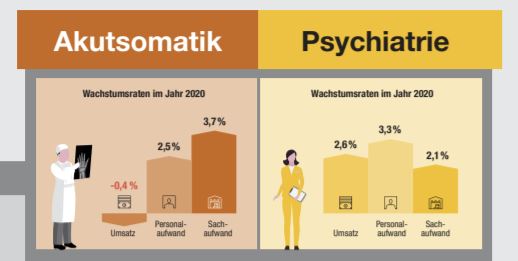Covid-19: Results of the new PwC hospital study
A new PwC financial study has examined the impact of Covid-19 on the financial health of healthcare providers. The pandemic-related loss in 2020 is CHF 1.3 to 1.5 billion. Only 28 percent of acute hospitals report a positive annual result in 2020.

© Hospital study PwC
The study "Swiss hospitals: How healthy were their finances in 2020" by PwC Switzerland looks at the financial, strategic and operational impact of Covid-19 on healthcare providers. The fact is that the pandemic placed enormous demands on the healthcare system.
Schmetotal rupture
As a result of the pandemic, Swiss hospitals and clinics suffered total financial losses (before cantonal contributions) of between CHF 1.3 billion and CHF 1.5 billion in the 2020 reporting year. The service providers came under strong pressure on the earnings side. Acute care hospitals experienced a sharp drop in revenue as a result of the ban on elective surgery in spring 2020. This was particularly pronounced in the inpatient area, with revenue losses of minus 4.2% compared with the previous year. In the outpatient sector, the decline was much less pronounced at minus 0.5%. Sales in the psychiatric clinics were only slightly lower than in the previous year, while sales in the rehabilitation division decreased considerably.
Profitability slumped
The EBITDAR margin of acute hospitals fell from 7.0% in the previous year to 5.3% in 2020, well below the minimum value of 10% defined by PwC and at the lowest level in the last five years. The picture is similar for EBITDA, EBIT and net profit margins in 2020, with only 28% of the acute hospitals surveyed reporting a positive annual result in 2020, down from 60% in 2019. Covid-19 clarified: Financial targets and sufficient earning power in normal years are central to building up reserves for difficult years and managing crises independently. Swiss hospitals should be able to survive on their own earnings power.
Need to catch up in digitalization
The pandemic has accelerated the digitalisation of the Swiss healthcare system. With the digital Covid certificate, the Federal Office of Public Health (FOPH) has set an important milestone. Lukas Engelberger, President of the Swiss Conference of Ministers of Public Health (GDK), sees the digital tools developed at short notice to combat the pandemic as a quantum leap in the digital transformation of the healthcare sector. At the same time, he sees a lot of catching up to do, for example with the electronic patient dossier.
Supplementary insurance market on the move
Service providers must promptly develop multi-benefit concepts to describe their innovative services in a comprehensible way. In the study, Philomena Colatrella, CEO of CSS Insurance, talks about the potential of flexible and dynamic insurance products with a strong focus on treatment quality.
Tariff systems of the future
Based on the history of the Swiss tariff landscape, the authors reflect on the outpatient tariff system of the future. For almost a decade, service providers in the inpatient sector have been billing on the basis of Diagnosis Related Groups (DRG). In an interview, Dr. med. Simon Hölzer, CEO of SwissDRG AG, attributes great development potential to the targeted further development of the DRG catalogues (see here, page 36). The experts agree that a tariff system of the future must eliminate misaligned incentives between outpatient and inpatient interventions and ensure permeability between inpatient and outpatient care with outpatient flat rates.
An initiative on behalf of those affected
With the Patient Empowerment Initiative, two insurers and two hospitals want to set a milestone in the direction of quality-oriented remuneration. In a pilot project, they want to create an incentive to enable patients to make fact-based and thus more targeted decisions. This is because the prevailing volume competition in the Swiss healthcare system creates false incentives, according to which treatment decisions are not always optimal for those affected and, in the worst case, are harmful. The tariff system envisaged by the Patient Empowerment Initiative focuses on the quality and benefits of treatment and aims to reduce overuse and misuse. In doing so, affected individuals take a more active role in decision-making about their treatment.
Press release PwC
To the study: The study "Swiss Hospitals: Insight into Finances 2020" by PwC Switzerland was conducted in September 2021 on the basis of the annual reports of 45 acute hospitals and 13 psychiatric clinics. For an in-depth insight into practice, the study contains various interviews with industry representatives and excursions on special topics.
For more information on PwC hospital study: www.pwc.ch/de/publications/2021/spitalstudie-2021.pdf
Other topics:
Medical devices are now covered by the Recycling Ordinance
Swiss Medtech calls for amendment of the national medical devices ordinance









